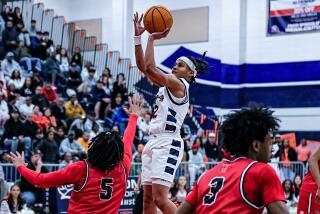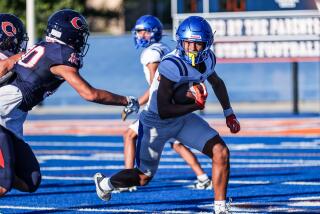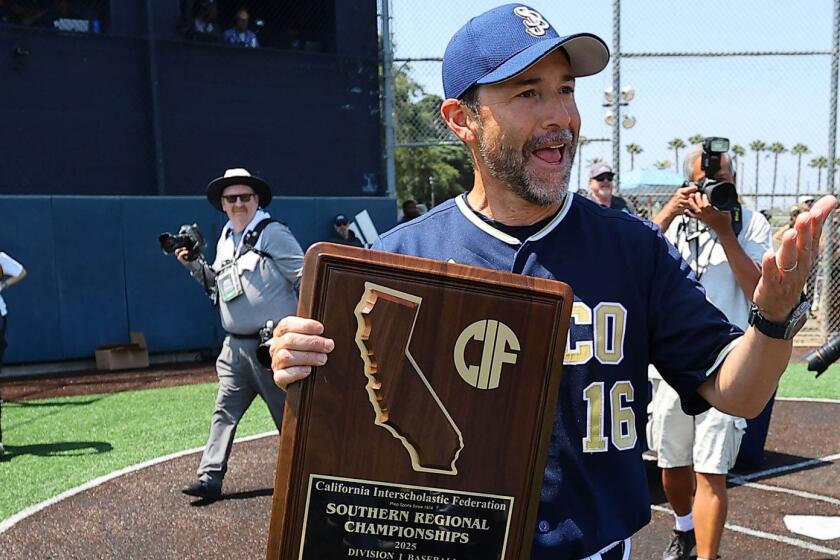Less Is More for Master’s
- Share via
NEWHALL — Statistics can be misleading. Just ask James Mosley of The Master’s College basketball team.
The 6-foot-3 senior forward has averaged nearly three points fewer per game and shot nearly three percentage points lower during the regular season than he did as a junior.
But when the No. 3-seeded Mustangs play Claflin, S.C., in the first round of the NAIA Division I tournament at the Mabee Center in Tulsa, Okla., at 10:30 PST today, a surgically repaired knee will enable Mosley to do things he couldn’t a year ago.
Last season, Mosley was named the NAIA Far West Region Independents player of the year after averaging 18.4 points and making 50.8% of his shots during the regular season, but he was slowed by a bone chip in his right knee in postseason play.
He averaged 14.4 points and shot 41.5% in the playoffs. The injury prevented him from slashing through the lane, running the break or shooting from outside like before.
“I didn’t want to use [the injury] as a crutch, but it was hard not to think about it in games,” he said. “There’d be times when I would wonder if I could make certain plays and it’s hard to be at your best when you’re thinking like that.”
Fast forward to last week’s NAIA Far West Region Independents championship game against Dominican.
Mosley scored 12 of the Mustangs’ 15 points during a 2 1/2-minute stretch in the second half of a 95-75 victory that gave Master’s (27-6) its third consecutive appearance in the NAIA Division I tournament.
Mosley had 24 points and 10 rebounds against Dominican to continue a tear in which he has averaged 23.7 points and 8.3 rebounds and shot 62.4% in the last six games. Overall this season, he’s averaging 15.9 points, 6.2 rebounds and shooting 48.4%.
“He’s just on a roll,” Master’s Coach Bill Oates said. “He’s playing great. His shooting is dynamic, he’s all over the court on defense and he’s rebounding better than he ever has.”
Mosley’s improved defense and rebounding are an indirect result of the shooting woes that plagued him during the early part of the season.
After undergoing surgery in July to remove the bone chips from his knee, Mosley was sidelined for four weeks. His fitness level was only 80% when the season began and didn’t reach 100% until January.
Although Mosley struggled offensively for much of the season--he averaged 14.1 points and shot 43.6% during the first 24 games--he discovered he could help the Mustangs in other ways.
“I watched a lot of film and that helped me understand the strengths and weaknesses of my game and what I needed to do to help the team,” he said. “I realized that if I could step up and get more rebounds and step up defensively, it would help us as a team.”
Mosley’s ability to play defense and crash the boards will be crucial if the Mustangs are to win their first national title.
Master’s, which advanced to the quarterfinals of last year’s tournament, is averaging 87.3 points and shooting 49.0%.
But it is difficult to shoot well from the field in five or six consecutive games in a national championship tournament.
Sooner or later, even the best shooting teams--see Kentucky in last year’s NCAA tournament--struggle. And when that occurs, defense is needed to win.
That’s why Mosley likes the Mustangs’ chances. They’ve held opponents to 41.2% shooting this season.
“We’re not as good a shooting team as we were last year because we lost some guys like Doug Leaman,” Mosley said. “But I think we’re a better defensive team and a better rebounding team.”
Leaman was a sharpshooting guard who averaged 11.7 points and shot 44.3% from three-point range as a senior last season. He is also one of the reasons Mosley went to Master’s.
The fifth of sixth children, Mosley was born and raised in Detroit.
The son of a pastor, he and his family moved to Roswell, N.M., when he was 13 and relocated to Tacoma, Wash., when he was 14.
He entered Tacoma Baptist High as a sophomore. As a junior, he and Leaman helped the team to a runner-up finish in the State Division A championships.
While Leaman went on to Master’s in the fall of 1991, Mosley moved to Indianapolis where he was a standout player for Colonial High as a senior.
Colonial was a small private school with a kindergarten through 12th-grade enrollment of 550 students, but Mosley played well enough to draw interest from NCAA Division I schools such as Ball State and Indiana State.
Mosley hoped to attend Ball State, but when the Cardinals offered a scholarship to another player, his father encouraged him to check out Master’s.
Mosley did and liked what he saw.
“I really loved the people and the way they carried themselves,” he said. “And I loved the Christian atmosphere. It was like a college version of Tacoma Baptist. I felt like God had sent me to Tacoma Baptist to prepare for Master’s.”
Like Tacoma Baptist, Master’s has a predominantly white student body. But Mosley, an African American, said he has always felt at home there.
“It wasn’t a big adjustment because I had gone to Tacoma Baptist,” he said.
“It did take some time to adjust to Tacoma because I was from Detroit, which is predominantly black. But I learned to appreciate the differences and diversity among people.”
Mosley has had a very positive experience at Master’s, but there have been some rough times.
His father died of kidney failure after a long bout with cancer before the start of his junior season.
Despite the loss, Mosley has moved on with his life and is looking forward to the final days of his college career.
“We’ve been talking about the national championships since conditioning started,” Mosley said. “I think we’ve got as good a chance as any team to win it.”
More to Read
Get our high school sports newsletter
Prep Rally is devoted to the SoCal high school sports experience, bringing you scores, stories and a behind-the-scenes look at what makes prep sports so popular.
You may occasionally receive promotional content from the Los Angeles Times.






